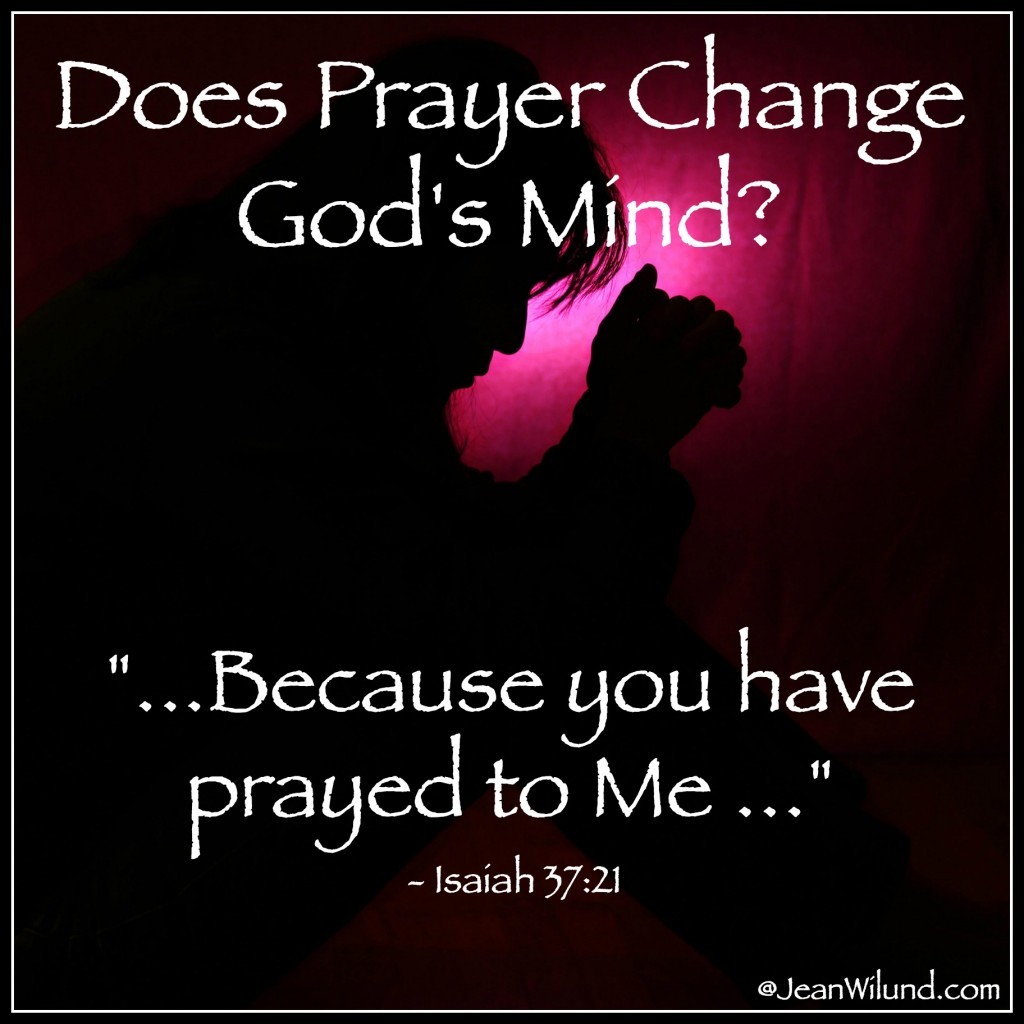
“Because you have prayed to Me”
Have you ever had an incident where you felt led to pray for someone or something, and then when you did, God answered exactly as you prayed?
Years ago, my youngest daughter needed 20 more points on her SAT score to win the top state scholarship. I prayed and asked God to give her what she needed.
To make it obvious that His power had given, I asked Him to give her exactly 20 more points. Or, if He preferred—because I preferred—He could give her 120 more points.
I prayed, and she took the test.
She got exactly 20 points!
What??!!
I’m thankful God answered out of the abundance of His kindness rather than out of the weakness of my faith.
“Because you have prayed to Me”
Isaiah 37:21
Because I prayed to God, did I successfully convince God to do something He hadn’t planned on doing?
Does prayer change God’s mind?
Let’s see what the Bible says.
Hezekiah Prayed
In 2 Kings 18-19, Sennacherib, the king of Assyria sent his commander to threaten Hezekiah, the king of Judah. If Hezekiah didn’t surrender, Sennacherib would simply destroy Hezekiah and Jerusalem.
He boldly asserted that Hezekiah’s God was completely unable to rescue Judah (2 Kings 18:13 – 2 Kings 19:37).
Hezekiah prayed, and God asserted His power over Sennacherib and Assyria’s mighty army.
“Because you have prayed to Me” (2 Kings 19:20)
Then it happened that night that the angel of the Lord went out and struck 185,000 in the camp of the Assyrians; and when men rose early in the morning, behold, all of them were dead. (2 Kings 19:35 NASB)
Hezekiah Prayed Again
Some time after that astounding victory, God sent the prophet Isaiah to Hezekiah with disturbing news: Hezekiah needed to set his house in order because he was going to die. (2 Kings 20:1-7)
Again Hezekiah prayed.
Again God did exactly what Hezekiah requested. God healed him.
Did Hezekiah’s prayer change God’s mind both times?
If he did, I’ve got some things I want to change God’s mind about, too.
Let’s think about this.
If We Can Change God’s Mind
If I can change God’s mind, then you can, too.
What if you and I want different things? I certainly don’t want you changing God’s mind.
In fact, do we really want a God who can be man-handled into changing His mind at all?
Plus, if God changes His mind then:
- He was either unsure about what He should do and our prayer nudged Him, OR
- He’s waiting to see how life pans out and then adjusts His decisions accordingly, OR
- He doesn’t really care one way or the other and simply waits for us to make a decision for Him, OR
- He was about to make a mistake and fortunately man was there to correct Him.
Scripture tells us none of these are true.
He who is the Glory of Israel does not lie or change his mind; for he is not a human being, that he should change his mind.
I Samuel 15:29 NIV
But the plans of the LORD stand firm forever, the purposes of his heart through all generations.
Psalm 33:11 NIV
He is the Rock, his works are perfect, and all his ways are just. A faithful God who does no wrong, upright and just is he.
Deuteronomy 32:4 NIV
God Works Out His Will in Prayer
Throughout Scripture we see that God asks questions and brings matters up to individuals for the purpose of working out His will, not because He needs help or more information.
God presents situations to His people to give them the opportunity to line their hearts up with His heart—not the other way around.
“For the eyes of the LORD move to and fro throughout the earth that He may strongly support those whose heart is completely His.”
2 Chronicles 16:9a NASB
King Asa’s Will vs God’s Will
In 2 Chronicles 16, God presented King Asa of Judah an opportunity to trust in Him to protect Judah when Israel came against them.
Asa didn’t go into the house of the Lord to pray and seek His will. He went in to bring out gold and silver to bribe the king of Syrian to turn against Israel instead. He trusted in gold and silver rather than prayers to his unfailing God.
God sent the prophet Hanani to Asa to remind him of His faithfulness in the past and to warn him of the consequences of his foolishness.
Asa had trusted in an earthly king rather than the sovereign God of all the earth.
“You have acted foolishly in this. Indeed, from now on you will surely have wars.”
2 Chronicles 16:9 NASB
Did Asa Hinder God’s Will?
Did God not get what He wanted in this situation because Asa didn’t pray?
God is fully able to get exactly what He wants every time.
He chooses to let man have his own way at times so that they—and we, thousands of years later—will understand the consequences of trusting in man instead of Him.
God fulfilled His will. He got what He wanted—to expose Asa’s heart.
Asa’s heart was to trust in a self-centered, sinful king of limited strength rather than in the all-powerful, all-loving God who never fails. His heart refused to line up with God’s heart, and God exposed it.
When God sent Hanani to Asa to confront him and give him a chance to repent and trust, Asa threw Hanani into jail.
Asa’s actions declared his independence from God. And he got it. God withdrew His protection, which brought Asa much suffering.
How tragic. Asa only needed to humble himself and pray, and then stand back and watch the power of God at work.
God looks for men and women to be pray-ers: vessels through which He’ll pour out His blessings and power onto the earth and accomplish His will—that which was already in His heart to do.
Now back to Hezekiah.
Did Hezekiah change God’s mind?
No, Hezekiah didn’t change God’s mind. God changed Hezekiah’s.
When God sent His prophet Isaiah to tell Hezekiah he’d soon die, God did so to elicit a response of faith from Hezekiah.
God gave him the chance to trust Him for his future. (Or not.) And to expose his faith.
Unlike Asa, Hezekiah didn’t lash out in anger at God’s prophet when he brought bad news. He turned his face to the wall and prayed. (2 Kings 20:2)
He didn’t fire off at God, telling Him He didn’t have the right to let him die. He prayed from the depth of his soul to the One he knew could change his future.
Hezekiah had shown himself to be a willing vessel for God to use to display His power. God did not disappoint. He left no doubt as to the expanse of His power in response to Hezekiah’s prayers.
“Because you have prayed to Me”
2 Kings 19:20
Unfortunately, later in Hezekiah’s life, he stopped being a willing vessel. Pride took over and ruled his heart instead.
Being a willing vessel is a day-by-day, moment-by-moment choice.
So what’s the final answer to whether prayer changes God’s mind?
The Final Answer: Four Truths & A Conclusion
I can’t begin to explain all the workings of God’s mind. My own mind is infinitesimally small compared to His and unable to comprehend all God does and thinks. But I have an opinion based on four powerful Truths we see in the Bible.
1. God is sovereign
If God isn’t sovereign over all, then He’s not sovereign at all. But He is.
He’s sovereign over all the affairs of the world from the beginning of time through forever.
No one has power over God. He never makes a mistake or changes his mind.
Declaring the end from the beginning, And from ancient times things which have not been done, Saying, “My purpose will be established, And I will accomplish all My good pleasure”
Isaiah 46:10 NASB
2. God uses prayer to change events on earth
The spirit of man is limited in strength, but the Spirit of God is all-powerful.
God has chosen to use prayer as a powerful, primary means to release His power on earth.
That’s not to say that God can only release His power through prayer. He’s never at our mercy. (See Isaiah 59:16 below.)
3. God raises up specific people to pray
Because God’s all-knowing, He knows who to alert about certain situations so they’ll pray.
God knows who to raise up to pray.
He also knows who would rather throw someone in jail for suggesting we pray to and trust in God.
Both glorify God:
The willing vessels glorify God by their faith and prayers, through which He works with power to accomplish His will.
The unwilling vessels (unwittingly) glorify God through the unfortunate and often tragic consequences that come from not trusting in Him.
He saw that there was no man, and wondered that there was no one to intercede; then his own arm brought him salvation, and his righteousness upheld him.
Isaiah 59:16, ESV
[“‘And wondered’ – This is language adapted to the mode of speaking among men. It cannot be taken literally, as if God was amazed by suddenly coming to the knowledge of this fact. It is designed to express, with great emphasis, the truth, that there was no one to intercede, and that the wicked world was lying in a helpless condition.” — Barnes Notes on the Bible.]
4. Prayer changes our hearts, not God’s
The prayer of faith changes our hearts from self-centered hearts to God-centered hearts.
And do not be conformed to this world, but be transformed by the renewing of your mind, so that you may prove what the will of God is, that which is good and acceptable and perfect.
Romans 12:2 NASB
God can work through even a little faith — the faith of a mustard seed. (Luke 17:6)
He works in astounding ways through pure faith.
God answered every prayer Jesus has prayed because His heart is always in perfect alignment with God’s heart. May we align our heart with God’s every day. Every minute.
Now to him who is able to do immeasurably more than all we ask or imagine, according to his power that is at work within us.
Ephesians 3:20
What About Unanswered Prayers?
No one other than Jesus has had all their prayers answered as they prayed them, because no one else has ever had such a perfect alignment of hearts with God.
Jesus didn’t pray for John the Baptist to be saved from prison or death. Only God knows why it wasn’t His will, but I have my thoughts, and they come from John’s own words: He must increase, but I must decrease. (John 3:30)
But that’s another post for another day.
CONCLUSION: Prayer does not change God’s mind. It changes ours.
Prayer transforms our minds, and molds us into willing vessels of faith through whom God can do the powerful work on earth that was already in His mind to do.
In view of all this, let’s humble ourselves before God and give Him our hearts.
Let’s ask Him to mold and shape our hearts and minds into shining reflections of His own Son.
And then let’s pray.
With our will in line with God’s, our prayers will move the mountains God desire to move in our world, nation, communities, families, and in our own hearts (Mark 11:23; Romans 8:29).







Jean, not only have you shared truth, you’ve done it in a winsome and convincing way. Thank you!
Kathy, I can’t thank you enough for your kind comment. That means a lot to me. I’m glad you enjoyed the article. I’ve been greatly impacted by studying this question on prayer and working through the answers as I read Scripture and the number of great books out there on the subject. It’s exciting to realize the power of prayer and how God uses it to draw us to Himself and bring Himself glory in ways we could never imagine on our own. Thanks for reaching out and commenting!
It brings me so much comfort to know I can’t change God’s mind. I don’t want to be in control of the events of this world, because I’d mess it up. I’m so grateful to serve a God who knows all and rules us with a heart of love. I can trust Him to do what is right and best. Thank you for this well-researched and biblically sound article. I’ll refer to it often and share it widely.
Thank you for your perspective. I believe I agree with most of it. My big question is, HOW exactly does “God use prayers to change events on earth” if he is completely sovereign over ever decision of every minute of our lives? He ordains everything according to his will. I believe the statement above suggests that prayer (intimate communication with God) does influence his decisions or events on earth? Thoughts?
Thank you for your thoughtful question. I confess that trying to fully understanding the ways of God pushes my brain to its limits, but I do believe we can understand enough to give us peace in God’s full sovereignty and our need to pray and the how of it all.
Consider God’s promise to Adam and Eve. Throughout history, Satan worked to keep God from fulfilling this promise of a Savior. Nothing and no one could stop God from sending Christ at the exact time He had prepared. The Jews tried to stone Jesus more than once but each time Jesus walked away without so much as pebble pelting Him. God’s sovereign will was that Jesus would go to the cross and die on the day ordained. Not get stoned or even crucified on a different day. And Jesus is coming back regardless of what anyone does or prays. We will not stop His sovereign will and eternal purposes no matter how hard we pray.
However…prayer does have an impact. I heard it explained this way that when a ship is heading from one destination to the next, the captain steers the ship there. It doesn’t matter how the passengers arrange the chairs on the deck, the ship still makes it to its destination. God has a purpose and a sovereign will that He will absolutely accomplish, but on the way, He calls us to participate in the arrangement of the chairs through prayer. But HOW is your question.
I’ll share two events from Scripture and hopefully they will give us insight to the HOW God uses prayer—but I doubt we’ll get all the answers we want because there truly is a mystery to the relationship between God’s sovereignty and man’s responsibility.
When we look at how God dealt with King Jehoshaphat starting in 2 Chronicles 18, we see the king determined to go his own way and ally himself with evil King Ahab. The enemy set their sites on Jehoshaphat, but when he cried out to God, they turned away. After the battle, God sent his prophet to confront Jehoshaphat for his evil alignment with Ahab. I’m convinced that God’s purpose for the battle and permitting Jehoshaphat to go with Ahab was accomplished, but I also believe that if Jehoshaphat hadn’t cried out to God, he might not have escaped unscathed. Since it’s clear that God’s purpose was for him to survive, we know he would have survived, but he may have sustained injuries. We can’t know since Scripture doesn’t tell us, but we do see that his humble cry to the Lord resulted in his salvation. But it didn’t save him from suffering other consequences.
Consider David when he sinfully ordered the census of Israel. In 1 Chronicles 21:1, Scripture says that Satan incited David to take the census. In 2 Samuel 24:1, Scripture says that God incited David. Which was it?
As I’ve quoted Martin Luther before, even the devil is God’s devil. God had an ultimate purpose that would be accomplished through the sin of Satan tempting David, and David choosing to go the way his heart wanted to go. God is never guilty of sin. David did exactly what he wanted to do. Satan did exactly what he wanted to do. But since God is sovereign over all power, the fact that Satan tempted David means he could only have done this with God’s permission.
God corrected David’s heart and brought it back into alignment with His and left a VIVID display of the egregious results of downplaying how serious sin really is. David surely didn’t believe that doing what even the brutal Joab knew and declared was wrong and sinful would be “that bad” or he would never have gone through with his sinful desire.
David was convicted of his sin, though, and prayed for forgiveness. God gave David three choices–all of them bad. God answered David’s prayer. It led to 70,000 people dying. It could have been worse if David hadn’t chosen the consequence that placed Israel into God’s hands rather than anyone else’s. David had fallen into the mindset that military power was of utmost importance. He realized and displayed that he came to understand and agree with God that entrusting themselves to God alone was the only wise choice for a king to make.
We don’t know what would have happened if David had not repented and sought forgiveness, nor what would have happened if David had chosen a different consequence–which I also consider a prayer of sorts since he was talking with God through the prophet Gad. This is the challenge. We can’t see what would have happened if someone had prayed differently because Scripture doesn’t record it. But we see God respond to prayers, and we see actions directly resulting from prayer. BUT we also see that not one time does God’s answering someone’s prayer thwart or change His ultimate purpose or eternal plans
When my kids were young, at times I had to tell them, “You can obey cheerfully, or you can obey through tears, but you will obey. Which will you choose?” There were times where I absolutely could not allow them to disobey. They might have to get a spanking to convince them, but they will obey. It was life or death–such as they were never ever allowed to wander into the yard with the swimming pool without an adult.
David ultimately returned to full surrender and trust in the Lord, but not until after he had the most severe discipline–which every king after him needed to understand. Sadly, most ignored the lesson–by God’s good sovereignty.
Imagine if God always kept us from sin, who would believe they need a Savior? Which Christian would fully trust God? But through prayer, God moves our hearts to expose themselves or align themselves with God. And our prayers moves us to action. Sometimes our prayers are pure selfishness, and we move to sin because God won’t answer those prayers–not the way we prayed them. But sometimes our prayers are biblical and pleasing to the Lord, and He delights to answer those, and we’re moved to action that is good and right. I can’t count the number of times I’ve gone to pray in anger over someone’s actions, and during my prayers I’ve been convicted to repent of my sinful anger and humble myself and respond in love. When I submitted to that conviction, good happened. When I refused to submit, bad happened. But I’m convinced that the level of good and bad was determined by the Lord and His sovereign and eternal will. Which brings us back to our brains hurting trying to understand the immensity of our God and His perfect ways.
If God were small enough to be understood, He wouldn’t be big enough to be God. And bottom line, God commands us to pray and declares that our prayers matter. That’s enough reason to obey even if we struggle to grasp the full how and why of it all.
I hope this at least gave you something to think about and inspired you to search the Scriptures for the answer. That’s where the answer lies. In His Word. You may be able to articulate it better than me. If you find a better explanation, please come back and share it here. I’m learning along with everyone else. You truly asked a great question. Thanks!!